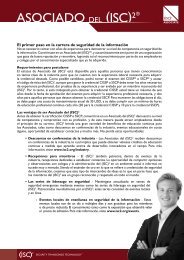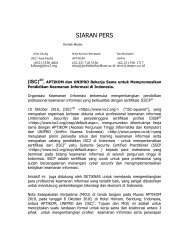State of Florida - ISC
State of Florida - ISC
State of Florida - ISC
- No tags were found...
You also want an ePaper? Increase the reach of your titles
YUMPU automatically turns print PDFs into web optimized ePapers that Google loves.
September 2010
How the <strong>State</strong> <strong>of</strong> <strong>Florida</strong> Builds Information SecurityExpertise Despite Escalating Risk and Tight Budgets.CHALLENGETraining and education have always been atop priority for the <strong>State</strong> <strong>of</strong> <strong>Florida</strong>’s Office<strong>of</strong> Information Security (OIS) within theAgency for Enterprise Information Technology(AEIT). The (OIS) was established immediatelyfollowing the events <strong>of</strong> 9/11. Its mission? To helpthe <strong>State</strong>’s executive branch agencies addressWith training as an integral factor in thesuccess <strong>of</strong> each focus area, the OIS laid out anaggressive and detailed training and educationprogram for its information security staff. Infact, its training plan is mapped out in a comprehensivethree-year matrix that illustrateshow the <strong>State</strong> will leverage its workforce tomeet federal, state and private informationcyber security issues and to ensure statewidesecurity standards.Helping state agenciescomply with all requirements such as HIPAA,PCI, and those set forth by the U.S. Department<strong>of</strong> Homeland Security (DHS) is critical tothe Office and AEIT’s success.compliance with Federal and <strong>State</strong> securitystandards. Even though legislation points theefforts <strong>of</strong> the OIS toward the executive branch<strong>of</strong> government, the courts, the <strong>Florida</strong> Legislature,cities, counties and municipalities arewilling participants.With technology evolving at what seems tobe the speed <strong>of</strong> light, how does AEIT keep itsThe Office’s five focus areas related to enterpriseinformation security are:information technology staff up-to-date onbest security practices?• Policy• Training• Risk management• Incident responseAnd in light <strong>of</strong> budget cuts, how does AEITmaintain its expertise in protecting critical,proprietary information?• Survivability1
SOLUTIONEstablish GoalsFirst, AEIT worked with the Information SecurityManager community within state agenciesto identify business requirements that needto be addressed, such as staff pr<strong>of</strong>essionaldevelopment goals.“One <strong>of</strong> the most valuable education programsthe <strong>State</strong> has engaged in has been CISSP ® CBK ®Review Seminars and examinations,” said Russo.“We stress this certification because it requiresour experienced managers to have a deepunderstanding <strong>of</strong> the latest, up-to-date informationon the full spectrum <strong>of</strong> security-relateddevelopments and topics.”“We determined which standards and certificationswould best meet our needs and puttogether a program that would take us there,”said Mike Russo, CISSP, and Chief InformationSecurity Officer (CISO) for the <strong>State</strong> <strong>of</strong> <strong>Florida</strong>.The <strong>State</strong> began <strong>of</strong>fering CISSP CBK ReviewSeminars to a select group <strong>of</strong> its pr<strong>of</strong>essionalstaff in 2004. This year, it contracted with(<strong>ISC</strong>) 2® to provide a CISSP Review Seminarand examination for 25 employees from many“We are constantly on the watch for emergingareas that require staff training. “In fact,” saidRusso, “the <strong>State</strong> <strong>of</strong> <strong>Florida</strong> was one <strong>of</strong> the<strong>of</strong> the <strong>State</strong>’s executive agencies, as well asLegislative, Inspector General and AuditorGeneral <strong>of</strong>fices.first to <strong>of</strong>fer training for ethical hacking andincident response.”“If we had more domestic security grant funds,we would have doubled the number <strong>of</strong> participants,”said Russo. “It’s critical for all <strong>of</strong> ourtechnologists, and those who fund, regulate andaudit them, to understand what the latest bestpractices are, and why we do what we do.”Russo says that the <strong>State</strong>’s security educationprogram focuses on national and internationalcertifications because they provide a globallyrecognized, independent and objective demonstration<strong>of</strong> an individual’s level <strong>of</strong> competence.Finding Funding“We try to help staff attain credentials in manyareas. It takes a well-rounded body <strong>of</strong> knowledgeto function effectively.”Millions <strong>of</strong> dollars <strong>of</strong> federal security funds areavailable to every state through the DHS, butthere is no uniformity in how states go about2
distributing those funds.Ideally, Congressforum to make a strong business case,” says Russo.would mandate that some <strong>of</strong> the funds beallocated to information security, but withstates cutting their budgets, such allocationis unlikely to happen without strong advocacy.<strong>Florida</strong> is divided into seven domestic securityregions, each chaired by state and local law enforcement<strong>of</strong>ficials. These regional committeeslook at potential terrorist activity and makerecommendations on solving security threats.Each year, those recommendations are vetted,and decisions are made on how to spend millions<strong>of</strong> dollars that the <strong>State</strong> receives from DHS.In addition to DHS money, CISOs can findfunds for information security initiativesthrough grants from the U.S. Department <strong>of</strong>Health, Department <strong>of</strong> Labor and the Department<strong>of</strong> Education.“As the <strong>State</strong>’s CISO, it’s my job to help allMake a Strong Business CaseThe <strong>State</strong> <strong>of</strong> <strong>Florida</strong> is known to have one <strong>of</strong>the best domestic security initiatives in thedecision-makers realize the importance <strong>of</strong>investing in their agency security teams todevelop effective information security,” said Russo.nation, and one that supports cyber issues.That success is due in large part to the ability<strong>of</strong> CISOs to make a strong business case fortheir priorities. So, how does the Office <strong>of</strong>Information Security get heard over the din <strong>of</strong>Technology alone cannot protect sensitiveinformation, and no amount <strong>of</strong> s<strong>of</strong>tware willever be as powerful as the people behind it, sotraining and education must be funded.voices clamoring for a piece <strong>of</strong> the funding pie?“So far,” said Russo, “we have been successfulAccording to Russo, much has to do with theway the <strong>State</strong>’s domestic security organizationis structured. It gives the <strong>State</strong> Chief InformationOfficer, the head <strong>of</strong> AEIT, a seat at thedecision-making table. “It’s up to informationsecurity leaders to make sure we use thatat establishing a consensus that our technologyand education needs are very important factors.”Russo advises CISOs in other states to finda way to bring awareness to the groups whodetermine how domestic security fundsare spent.3
“CISOs need to be excellent advocatesfor their technology and training needs,” saidRusso. “One <strong>of</strong> the mistakes we make astechnologists,” he says, “is that we don’t addressthe business needs. Business leadersmake the decisions on where money is spent,and it is our responsibility to help them understandwhy information security is critical totheir success – not in a techie way – but bymaking a strong business case for it.”RESULTSMore Qualified People“Our role is to protect information assets,”said Russo. “The (<strong>ISC</strong>) 2 Review Seminars helpensure that our people know how to do that.Earning and maintaining the credentials meansthat they not only have the required knowledgebut that they are continually updating theirknowledge in line with the constantly evolvingthreats and changes in the industry. In addition,membership in a pr<strong>of</strong>essional certification bodyensures they have made a commitment to highethical standards. Everyone who attended theReview Seminar is more capable as a result <strong>of</strong>it,” he said. “The (<strong>ISC</strong>) 2 instructor was incredible.He was personable, and his experienceand background provided insights and reallifeexamples that made all <strong>of</strong> the informationunderstandable and memorable.”In addition, the (<strong>ISC</strong>) 2 credentials are a part <strong>of</strong>the <strong>State</strong>’s career mapping process. By providinga path for employees to advance, <strong>Florida</strong> isbetter positioned to retain them as they growmore experienced.“We associate certain credentials with job descriptions,”says Russo. “They help us identifycandidates for new roles and responsibilities.”Increased Level <strong>of</strong> Pr<strong>of</strong>essionalism“Credentials have a positive influence on ourtightly knit community <strong>of</strong> information securitymanagers,” said Russo. “Employees who haveattained credentials are held to a higher standardby the organization and their peers, andthey become evangelists, supporting othersto move toward certification. Once credentialed,they have access to all the advantages andresources available to certified pr<strong>of</strong>essionals,which benefits the entire agency.”“We are very pleased with the results wehave achieved from the CISSP Review Seminar,”said Russo. “We will continue to <strong>of</strong>fer coursesfor (<strong>ISC</strong>) 2 credentials until the majority <strong>of</strong>the <strong>State</strong>’s information security pr<strong>of</strong>essionalsare certified.”4
Federal Funding for Cyber Security: A “Crisis <strong>of</strong> Prioritization”The security <strong>of</strong> state networks has serious implications for homeland security, as it affects bothcontinuity <strong>of</strong> government and the operations <strong>of</strong> critical infrastructure. The states and federalgovernment must collaborate in cyber security protection, recovery and restoration. Despite theserious and urgent situation, it is <strong>of</strong>ten difficult for state CIOs to secure federal funding for theircyber security efforts. Cyber security protection must compete for funding against more visibleand politically appealing homeland security applications. NASCIO has been advocating beforeCongress for the establishment <strong>of</strong> a cyber security grant program dedicated to improving cyberprevention, protection, response, and recovery capabilities at both the state and local governmentlevels. In view <strong>of</strong> budget constraints, NASCIO has also been advocating that at minimum DHSand FEMA should set aside funding for cyber security programs and projects that DHS give higherpriority to state cyber security grants program to assist states. The purpose <strong>of</strong> the grant programwould be to demonstrate best practices, innovation and knowledge transfer regarding cybersecurity within <strong>State</strong> organizations. Funds would be used for supporting the enhancement <strong>of</strong>cyber security preparedness in the states by assisting them with network sensing, intrusiondetection and security related operations equipment, expanding security awareness campaigns,assisting in restoration and recovery efforts in the event <strong>of</strong> a cyber attack, and providing technicaltraining and certification for protecting programs administered by the states.
















